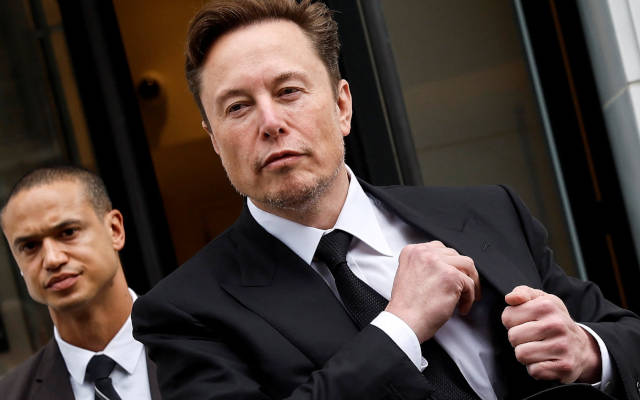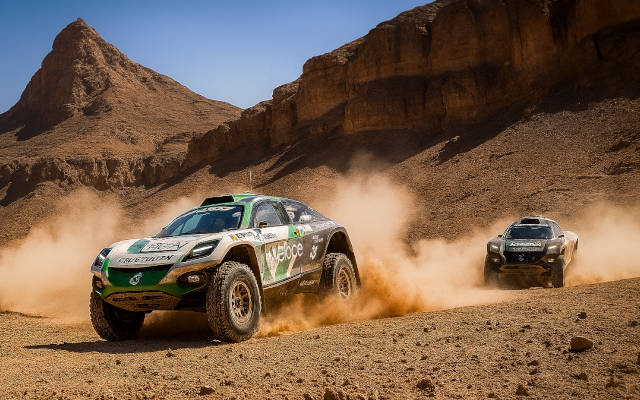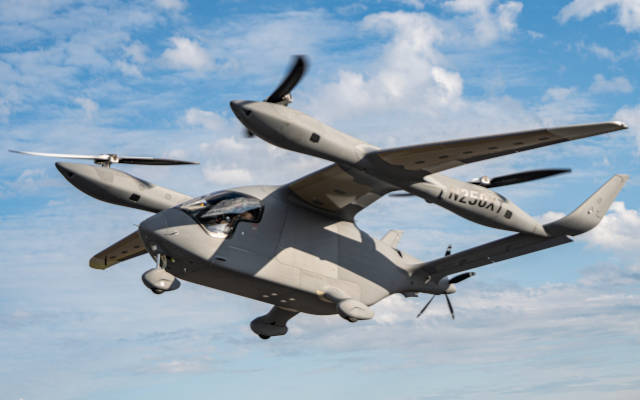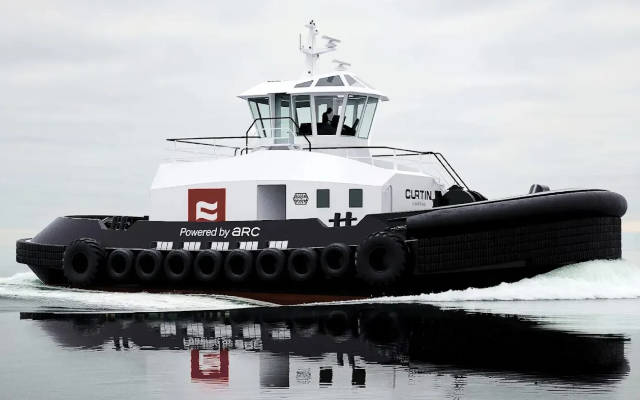 EDITOR'S PICK
EDITOR'S PICK
Where’d the Billion Come From? Musk's Tesla Buy Raises Questions
17 Sep 2025 | Synopsis
 Elon Musk's $1B Tesla stock purchase, made via his personal trust, sparked a surge in share price and raised questions about how the buy was funded. Likely financed through margin loans, derivatives, or asset reallocation, the move increased Musk's net worth by up to $8.6B. The timing aligns with Tesla's proposed $1T compensation plan, suggesting a strategic gesture to boost investor confidence and governance optics.
Elon Musk's $1B Tesla stock purchase, made via his personal trust, sparked a surge in share price and raised questions about how the buy was funded. Likely financed through margin loans, derivatives, or asset reallocation, the move increased Musk's net worth by up to $8.6B. The timing aligns with Tesla's proposed $1T compensation plan, suggesting a strategic gesture to boost investor confidence and governance optics. Extreme H: Hydrogen Racing's Bold New Frontier
17 Sep 2025 | Synopsis
 Extreme H is the world's first hydrogen-powered off-road racing series, debuting in Qiddiya City, Saudi Arabia. Evolving from Extreme E, it features gender-equal teams, zero-emission Pioneer 25 SUVs, and green hydrogen supplied via electrolysis. The rugged desert course tests fuel cell performance on gradients up to 130%. Backed by Saudi Vision 2030, the series aims to prove hydrogen's viability and promote sustainable motorsport innovation.
Extreme H is the world's first hydrogen-powered off-road racing series, debuting in Qiddiya City, Saudi Arabia. Evolving from Extreme E, it features gender-equal teams, zero-emission Pioneer 25 SUVs, and green hydrogen supplied via electrolysis. The rugged desert course tests fuel cell performance on gradients up to 130%. Backed by Saudi Vision 2030, the series aims to prove hydrogen's viability and promote sustainable motorsport innovation.Seattle's Sound Transit: Ridership, Energy, and Fiscal Challenges
16 Sep 2025 | Synopsis
 Seattle's Sound Transit has expanded its Link light rail system to 45 miles, offering fast, affordable, and eco-friendly travel powered by hydro and wind energy. Ridership hit 3.08 million in October 2024, with fares as low as $1 for seniors and free for youth. A Lynnwood–SEA Airport trip takes 80–85 minutes by rail, beating car travel in cost and emissions. Despite success, Sound Transit faces need for a substantial financial overhaul.
Seattle's Sound Transit has expanded its Link light rail system to 45 miles, offering fast, affordable, and eco-friendly travel powered by hydro and wind energy. Ridership hit 3.08 million in October 2024, with fares as low as $1 for seniors and free for youth. A Lynnwood–SEA Airport trip takes 80–85 minutes by rail, beating car travel in cost and emissions. Despite success, Sound Transit faces need for a substantial financial overhaul.How FAA's eVTOL Pilot Could Transform U.S. Air Travel
14 Sep 2025 | Synopsis
 The FAA launched the eVTOL Integration Pilot Program (eIPP), a 3-year initiative inviting governments and private partners to test electric air taxis and other advanced air mobility (AAM) aircraft. The goal is to gather data to shape future regulations and demonstrate real-world use cases like cargo and medical transport. Companies like Joby, Archer, Beta, and Wisk plan to participate, aiming to revolutionize U.S. air travel.
The FAA launched the eVTOL Integration Pilot Program (eIPP), a 3-year initiative inviting governments and private partners to test electric air taxis and other advanced air mobility (AAM) aircraft. The goal is to gather data to shape future regulations and demonstrate real-world use cases like cargo and medical transport. Companies like Joby, Archer, Beta, and Wisk plan to participate, aiming to revolutionize U.S. air travel.Arc Announces $160M Deal With Curtin Maritime For Eight Hybrid-Electric Tugboats
14 Sep 2025 | Synopsis
 Arc signed a $160M deal with Curtin Maritime to deliver eight hybrid-electric tugboats, marking the largest commercial deployment of electric workboats. Built with Snow & Co, the tugs feature Arc's 4,000+ HP electric powertrains and 6 MWh battery buffers. The first four are due by 2027. The project aims to modernize U.S. ports with efficient, low-maintenance, cost-effective vessels, challenging diesel norms and advancing marine electrification.
Arc signed a $160M deal with Curtin Maritime to deliver eight hybrid-electric tugboats, marking the largest commercial deployment of electric workboats. Built with Snow & Co, the tugs feature Arc's 4,000+ HP electric powertrains and 6 MWh battery buffers. The first four are due by 2027. The project aims to modernize U.S. ports with efficient, low-maintenance, cost-effective vessels, challenging diesel norms and advancing marine electrification.
 EVWorld Exclusive
EVWorld Exclusive
Electric Icons in the Making: Audi Concept C vs. Chevrolet Corvette EV
23 Oct 2025 |  Audi's Concept C previews a refined electric GT built on the mature PPE platform, likely arriving by 2026. Chevrolet's Corvette EV promises supercar performance but faces packaging and thermal challenges. Audi is closer to production; Corvette remains in early development. Both reflect divergent strategies in electrifying legacy sports cars, with Audi emphasizing platform maturity and Chevrolet pursuing brand continuity through engineering innovation.
Audi's Concept C previews a refined electric GT built on the mature PPE platform, likely arriving by 2026. Chevrolet's Corvette EV promises supercar performance but faces packaging and thermal challenges. Audi is closer to production; Corvette remains in early development. Both reflect divergent strategies in electrifying legacy sports cars, with Audi emphasizing platform maturity and Chevrolet pursuing brand continuity through engineering innovation.
Electrification Is Not an Oversimplification
23 Oct 2025 |  Despite critiques that the quest for global electrification is "simplistic", the transition is strategic and necessary. Grid upgrades, battery innovation, and tailored policies make electrification viable. Sodium-ion batteries and recycling reduce material risk. Compared to fossil fuels, electrification offers cleaner, safer, and more resilient systems. Complexity demands better design - not delay.
Despite critiques that the quest for global electrification is "simplistic", the transition is strategic and necessary. Grid upgrades, battery innovation, and tailored policies make electrification viable. Sodium-ion batteries and recycling reduce material risk. Compared to fossil fuels, electrification offers cleaner, safer, and more resilient systems. Complexity demands better design - not delay.
What Is the Real Cost to Replace EV Tires?
23 Oct 2025 |  A recent BGR article overstates EV tire costs and ignores fuel savings, regenerative braking, and tire tech advances. Most EV drivers spend ~$2,100–$2,700 on tires over 100,000 miles - not $3,600. EVs save thousands in fuel and benefit from smoother wear profiles. Brands like Goodyear and Michelin now offer EV-specific tires with longer life and better efficiency. The article lacks context and deserves correction.
A recent BGR article overstates EV tire costs and ignores fuel savings, regenerative braking, and tire tech advances. Most EV drivers spend ~$2,100–$2,700 on tires over 100,000 miles - not $3,600. EVs save thousands in fuel and benefit from smoother wear profiles. Brands like Goodyear and Michelin now offer EV-specific tires with longer life and better efficiency. The article lacks context and deserves correction.
The Battery Divide: Strategic Choices in the Global Race to Electrify Mobility
23 Oct 2025 |  Toyota's "1 EV = 90 hybrids" logic reflects lithium scarcity, but sodium-ion batteries challenge that premise. Sodium offers low-cost, abundant chemistry for short-range EVs, decoupling electrification from lithium dependence. National policy shapes adoption: Europe favors full EVs, the U.S. subsidizes hybrids, and emerging markets seek pragmatic solutions. The battery divide is not just technical - it's strategic, reshaping the future of mobility.
Toyota's "1 EV = 90 hybrids" logic reflects lithium scarcity, but sodium-ion batteries challenge that premise. Sodium offers low-cost, abundant chemistry for short-range EVs, decoupling electrification from lithium dependence. National policy shapes adoption: Europe favors full EVs, the U.S. subsidizes hybrids, and emerging markets seek pragmatic solutions. The battery divide is not just technical - it's strategic, reshaping the future of mobility.
Irizar Expands Electric Bus Lineup with Global Reach and Long-Range Performance
22 Oct 2025 |  Irizar has launched two new electric buses - the ie bus and i3 Normal Floor - with over 450 km range, advanced safety systems, and modular lithium-ion batteries. The Spanish manufacturer has delivered over 1,000 electric buses globally since 2014. The new models are lighter, seat up to 53 passengers, and meet European safety and cybersecurity standards. With deployments in Europe, Latin America, and Oceania, Irizar is positioned as a global leader in zero-emission transit.
Irizar has launched two new electric buses - the ie bus and i3 Normal Floor - with over 450 km range, advanced safety systems, and modular lithium-ion batteries. The Spanish manufacturer has delivered over 1,000 electric buses globally since 2014. The new models are lighter, seat up to 53 passengers, and meet European safety and cybersecurity standards. With deployments in Europe, Latin America, and Oceania, Irizar is positioned as a global leader in zero-emission transit.
SEARCH RSSTREAM
 60 New Postings In Past 24 Hours
60 New Postings In Past 24 Hours
Category:autonomy
Region:AsiaPacific
Date:23 Oct 2025
Category:mobility
Region:IndoAsia
Date:23 Oct 2025
Category:mobility
Region:NoAmerica
Date:23 Oct 2025
Category:mobility
Region:AsiaPacific
Date:23 Oct 2025
Category:mobility
Region:NoAmerica
Date:23 Oct 2025
Category:finance
Region:NoAmerica
Date:23 Oct 2025
Category:mobility
Region:NoAmerica
Date:23 Oct 2025
Category:mobility
Region:Global
Date:23 Oct 2025
Category:autonomy
Region:NoAmerica
Date:23 Oct 2025
Category:mobility
Region:NoAmerica
Date:23 Oct 2025
Category:mobility
Region:AsiaPacific
Date:23 Oct 2025
Category:mobility
Region:AustralPacific
Date:23 Oct 2025
Category:mobility
Region:NoAmerica
Date:23 Oct 2025
Category:mobility
Region:NoAmerica
Date:23 Oct 2025
Category:mobility
Region:Global
Date:23 Oct 2025
Category:mobility
Region:NoAmerica
Date:23 Oct 2025
Category:review
Region:AsiaPacific
Date:23 Oct 2025
Category:mobility
Region:NoAmerica
Date:23 Oct 2025
Category:finance
Region:NoAmerica
Date:23 Oct 2025
Category:mobility
Region:NoAmerica
Date:23 Oct 2025
